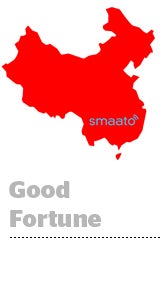 Another day, another acquisition of a mobile company by a Chinese conglomerate.
Another day, another acquisition of a mobile company by a Chinese conglomerate.
Publisher-focused mobile ad exchange Smaato will be snapped up by (this is a mouthful) Spearhead Integrated Marketing Communications Group, a Beijing-based offline marketing service provider.
Spearhead will shell out $148 million on the deal, pending the usual approvals.
Getting acquired by a Chinese company is trending right now.
In February, a conglomerate of Chinese companies pooled $1.2 billion to acquire Opera Mediaworks, and that same month, app monetization company NativeX was acquired by Chinese mobile ad platform Mobvista for a little under $25 million.
“There is a trend around very large, cash-rich Chinese companies making a move internationally across specific verticals, especially mobile, media and data,” said Shobhit Shukla, CRO and co-founder of location data company Near. “It’s not surprising, and I think we’ll see more of it.”
Smaato’s been around for quite awhile. Founded in 2005, the company started out a self-described “ad enabler for mobile phones.”
In other words, ad network mediation. Like several of its cohorts, the company later changed its stripes and moved into the mobile SSP space when the market started to transition away from network opacity. Smaato also has DSP functionality.
Smaato’s fate is starkly different from another early stage mobile ad tech company, Fiksu, which was absorbed last week into ClickDealer, the marketing performance arm of a holding company called Noosphere, in what one insider called a “hostile bank takeover.”
While it’s true that there’s been commoditization of the SSP space – as Casey Saran, GM of programmatic and strategic partnerships at Yieldmo, noted in a recent AdExchanger column, ”Just being the pipes isn’t enough anymore” – Smaato seems to have kept itself relevant.
“Smaato was an early player in the mobile RTB landscape, offering publisher tools to help monetize and optimize an application’s users,” said Keith Petri, chief strategy officer at cross-device company Screen6. “The true value of a supply-side partner is its SDK distribution, which has become increasingly difficult to scale.”
One way to avoid becoming a commodity in the market is to position that value as complementary to the growing stack of an acquirer with deep pockets.
Smaato CEO Ragnar Kruse told AdExchanger that the company will remain largely independent within Spearhead and keep its name.
“They leave their acquired companies to operate independently, and then they have an integration team working on the synergies between the companies, while still letting them grow their business,” he said.
Spearhead has lately acquired a range of China-based companies, including a consulting firm and a software company. Smaato is its first international acquisition.
“In the next two or three years, I could see China bypass even the US when it comes to mobile ad spend, when you look at the smartphone penetration – 1 billion devices – and how dominant the mobile market is,” Kruse said.
Exit or investment?
Smaato has raised just over $41 million since it was founded, most recently through a $25 million Series E in 2014 led by EDBI, Singapore Press Holdings Ltd. and Aeris Capital, a private equity fund run by Klaus Tschira on behalf of a prominent European family that’s invested quite a lot of coin in ad tech companies over the years.
Aeris was Smaato’s most prolific investor, and the firm participated in every single one of Smaato’s rounds. But when Tschira – also one of the co-founders of SAP – passed away in April 2015, the family decided to change its strategy and pull back on its investment in Smaato.
That put Kruse in a bind. But in the end, “We also saw it as a strategic business opportunity,” he said. It was Kruse’s task to either find a new institutional investor or a buyer. Spearhead seemed like the more interesting option.
“Spearhead will provide us with a big fund that will allow us to do acquisitions ourselves and drive organic growth,” Kruse said. “That’s the big difference between this and a financial investor that basically comes in and says, ‘You have a three- to five-year return horizon.’”












